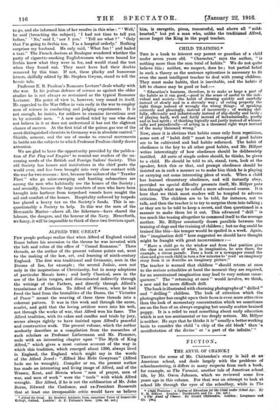ALFRED THE GREAT.*
FEW people perhaps realize that when Alfred of England visited Rome before his accession to the throne he was invested with the belt and robes of the office of " Consul Romanus." Three threads, as the author of the present volume points out, went to the making of the law, art, and learning of ninth-century England. The first was traditional and Germanic, seen in the Dooms of Ins, for example ; the second Judaic, seen not only in the inspirations of Christianity, but in many adoptions of particular Mosaic laws ; and lastly Classical, seen in the use of the Latin tongue, and disseminated indirectly through the writings of the Fathers, and directly through Alfred's translations of Boethius. To Alfred of Wessex, when he had freed the land from the brutalities of the Danes, the " Victories of Peace " meant the weaving of these three threads into a coherent pattern. It was in this work and through the azure, scarlet, and gold that the loving artificer wove into his web, not through the works of war, that Alfred won his fame. The Alfred tradition, with its cakes and candles and trials by jury, seems always rightly to have insisted upon Alfred's peaceful and constructive work. The present volume, which the author modestly describes as a compilation from the researches of such scholars as Professor Lieberman and Mr. Plummer, ends with an interesting chapter upon " The Myth of King Alfred," which gives a most curious account of the way in which this tradition, which emerged about 1200, always lived in England, the England which might say in the words of the Alfred Jewel : ".1Elfred Mec Heht Gewyrcan" (Alfred bade mo be wrought). Compiler or no, the present author has made an interesting and living image of Alfred, and of the Wessex, Kent., and Mercia whose " men of prayer, men of war, and men of work " were the " tools " with which Alfred wrought. Her Alfred, if he is not the sublimation of Mr. John Burns, Edward the Confessor, and ex-President Roosevelt that at least one irresponsible critic would have us believe
• Arred the Great. By Beatrice Adelaide Lees, sometime Tutor of Somerville College, Oxford. London: O. P. Putnam's Sons. Lies. ed. net.l
him, is energetic!, pious, resourceful, and above all " mild- hearted," but yet a man who, unlike the traditional Alfred, never forgot the King in the pupil teacher.


































 Previous page
Previous page